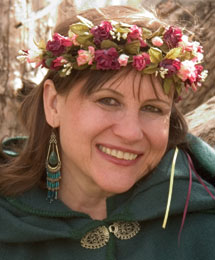Software Cinema DVD Training; Are They Effective Teaching Tools? A Walk Through Lesson With Steve Anchell Page 2
5. The last step is to reduce the Red 1 layer's Opacity to 0 percent
then slowly bring it back up until a pleasing color is achieved. To do this,
use the Opacity slider on the top right-hand side of the Layers palette. Click
on the arrow, the slider is enabled, move it to zero, and then slide it to the
right. I found around 25 percent gave a healthy glow without looking artificial.
Clicking on the eye to the left of Red 1 layer will give a before and after
preview.
6. Let's bring in some highlights on her cheeks, chin, and nose. This
will help add dimension to the portrait. Make a new layer by Opt/Alt-clicking
on the New Layer icon. Name this layer "Highlights."
Pick the color "white" from the Swatches palette. Zoom in, select
the Brush tool again, set the Opacity to 10 percent, choose a brush of about
150 pixels, and begin "puffing" white into the areas you wish to
accent. Do this with quick clicks of the mouse. You can also brush on the white
for more precise touches, such as lightening under the eyebrows and eyes, and
the "milk mustache," which will be toned down later (#4). Be certain
to disable shape dynamics and enable smoothing in the Brushes palette.
 |
|
|
7. To clean up the overspray add another layer mask in the same manner as
before: 100 percent Opacity, 100 percent Flow, black foreground brush. Clean
any white paint that might have gotten into the eyes or other areas not desired.
Now, reduce the Brush Opacity to about 30 percent and, using a smaller brush,
carefully contour the white areas on the cheeks, chin, and other areas where
you want highlights to remain while appearing as if they fit the area.
The last step is to reduce the Opacity of the Highlight layer on the Layers
palette to zero and then slowly move it back up until the highlights look pleasing
and natural. I found about 16 percent worked for me (#5). The final result can
be seen by comparing the before portrait, #1, with the after portrait (#6).
 |
|
|
Conner-ziser goes further by explaining how to whiten the eyes, add catchlights, color the irises, add eyelashes, prepare the image for painting effects, and more. But my purpose is not to teach you everything on the DVD but to help you decide if you should invest in this particular DVD for the lessons it contains.
 |
|
|
If you want to learn more about portrait-enhancing techniques in Photoshop
and Painter from Conner-ziser you can purchase the DVD online from Software
Cinema at: www.software-cinema.com.
For more information, contact Software Cinema, 13223 Black Mountain Rd., 1-260,
San Diego, CA 92129; (858) 413-4100.
- Log in or register to post comments

































